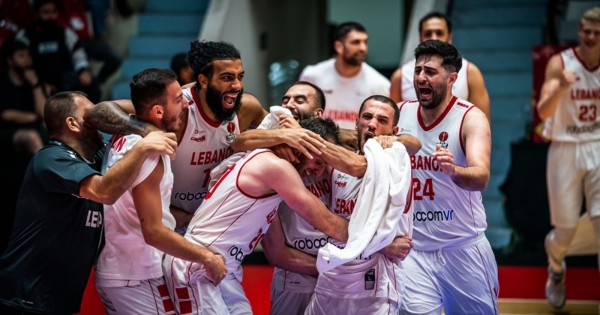The Lebanese and Jordanian teams returned the Arabs to the Asian basketball card through a wide door after reaching the semi-finals of the Asian Basketball Cup in the Indonesian capital Jakarta after a long absence of the Arabs from the last square lasting 11 years. But each team has its own story of suffering and trials.
The results of Jordan and Lebanon, who will meet in the semi-finals on Saturday, after defeating three-time champions Iran (91-76) and China’s record 16 titles (72-69) in the quarter-finals, was a significant event for the two countries.
This is as Jordanian basketball has seen a decline amid declining interest in the local league, which has lost its luster due to the reluctance of businessmen or private companies to sponsor clubs, in contrast to the pre-2015 period when sponsored clubs such as Fastlink emerged. (later Zain), applied sciences and others who did not revive the game, but contributed to its revival and fame.
At that time, Jordanian teams achieved outstanding results in Arab and Asian countries, reaching the Asian Club Cup in 2006 through Zain Club, then the Jordanian team became a notable Arab and Asian force, finishing third in the 2009 Asian Cup and then second in 2011 year.
In order to point out the difficulties faced by Jordanian basketball at the local level and to prevent its disappearance after being unable to organize local tournaments for a long time, the Football Association is funding clubs to the maximum to pay the wages of some outstanding players who represent the national team, which includes ten people. out of 12 playing in the local league.
Coach Wissam Al-Su’s team is counting on naturalized American Dara Tucker (Brazilian Flamengo) and his player Ahmed Al-Duwayri (Fenerbahçe Al-Turki), Freddy Ibrahim and Zaid Abbas.
– “The life of a Jordanian player is difficult” –
Former Jordan national team captain Zaid Al-Has, who accompanied the Jordanian basketball team’s successes between 2006 and 2013, explains to AFP the difficulties the game is facing: “The results do not reflect the degree of development that is to come. place to make changes to the Jordanian basket, we have no new blood from the players to compensate for the players who intend to retire soon.
He continued, “We don’t have any plan for the national team and also for the age groups to create a new generation. We need to change the whole culture in order to develop and succeed in the coming years.”
And Al-Has, who was a defensive player, added: “I can say that we have the worst lifestyle for a basketball player in any country in the world. Players are paid less than they should be and are not getting the recognition they deserve. or sufficient guarantees for their future.”
This problem facing Jordanian basketball is different from its Lebanese counterpart, as the players live semi-professionally with relatively high salaries compared to other professions.
However, the Land of the Cedars is going through the worst economic and life crisis in decades, coinciding with the horrific explosion that rocked the capital city of Beirut in August 2020, killing more than 200 people and injuring more than 6,500 people. caused widespread destruction in a number of districts of the capital.
When massive protests erupted in October 2019, the league was suspended and the season officially canceled later, prompting some players to retire, including current national team player Eli Chamoun, who announced his retirement from basketball to work in Saudi Arabia . He later reconsidered his decision.
Many other nationality internationals also left the country, such as Joseph Chartouni, Charles Tabet, Daniel Fares and Ghassan Nehme, before the game regained some of its recovery over the past two years, yet to reach where it had gone before. 2019 in terms of well-being in the salaries of players. The arrival of the brightest foreign players.
The Lebanese players’ statements reflected their awareness of the suffering of citizens suffering from severe hardships such as lack of electricity, high cost of living, and declining public services. However, they find in their Salwa team a glimmer of hope and an outlet for them, as almost eight thousand spectators gathered in the past month to support the national team against Jordan in qualifying. The World Cup ended with the victory of the land owners.
“This victory means a lot to our people who fight every day. We come from a broken, sad country, we want to make our people happy and raise the Lebanese flag to the top,” said Lebanese playmaker and star Wael Arakji, 27. who led coach Jad El Hadj’s team against China with 32 points.
– “A glimmer of hope for the Lebanese” –
From Dubai, where thousands of Lebanese have been forced to leave in search of work, Lebanese national team legend Fadi Al-Khatib told AFP: “These are amazing results and we hope the team will continue to the end. … What is happening is a glimmer of hope for Lebanese youth and gives them a boost in light of what we are going through.”
Al-Khatib, who led the Lebanese national team to second place in Asia three times, continued: “In our era, we also competed with the most important Asian and international teams, and comparisons between one generation and another do not help. but the bottom line is that in these two eras we represent Lebanon best.”
“I always speak to the players personally as well as to the technical staff and support them in every possible way,” added Al-Khatib, who announced his retirement two years ago after more than 25 years in stadiums.
With the guarantee of an Arab team reaching the final for the first time since 2011, winning the title will be a historic precedent for the Arabs in the continental championship.
Source: El Iktisad
